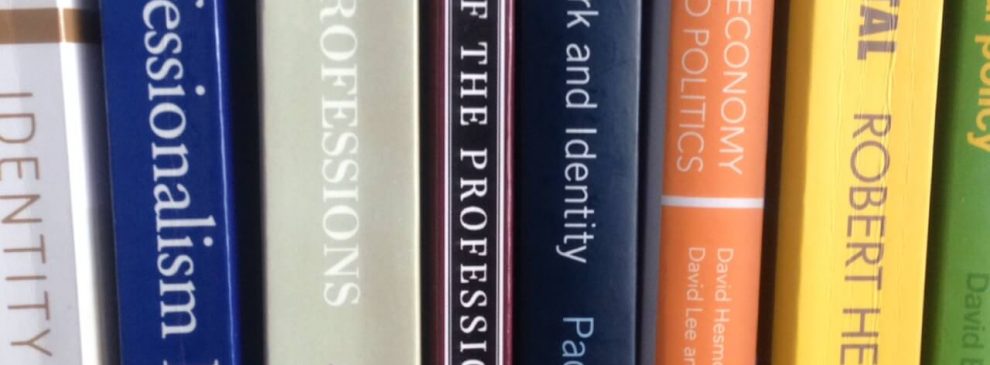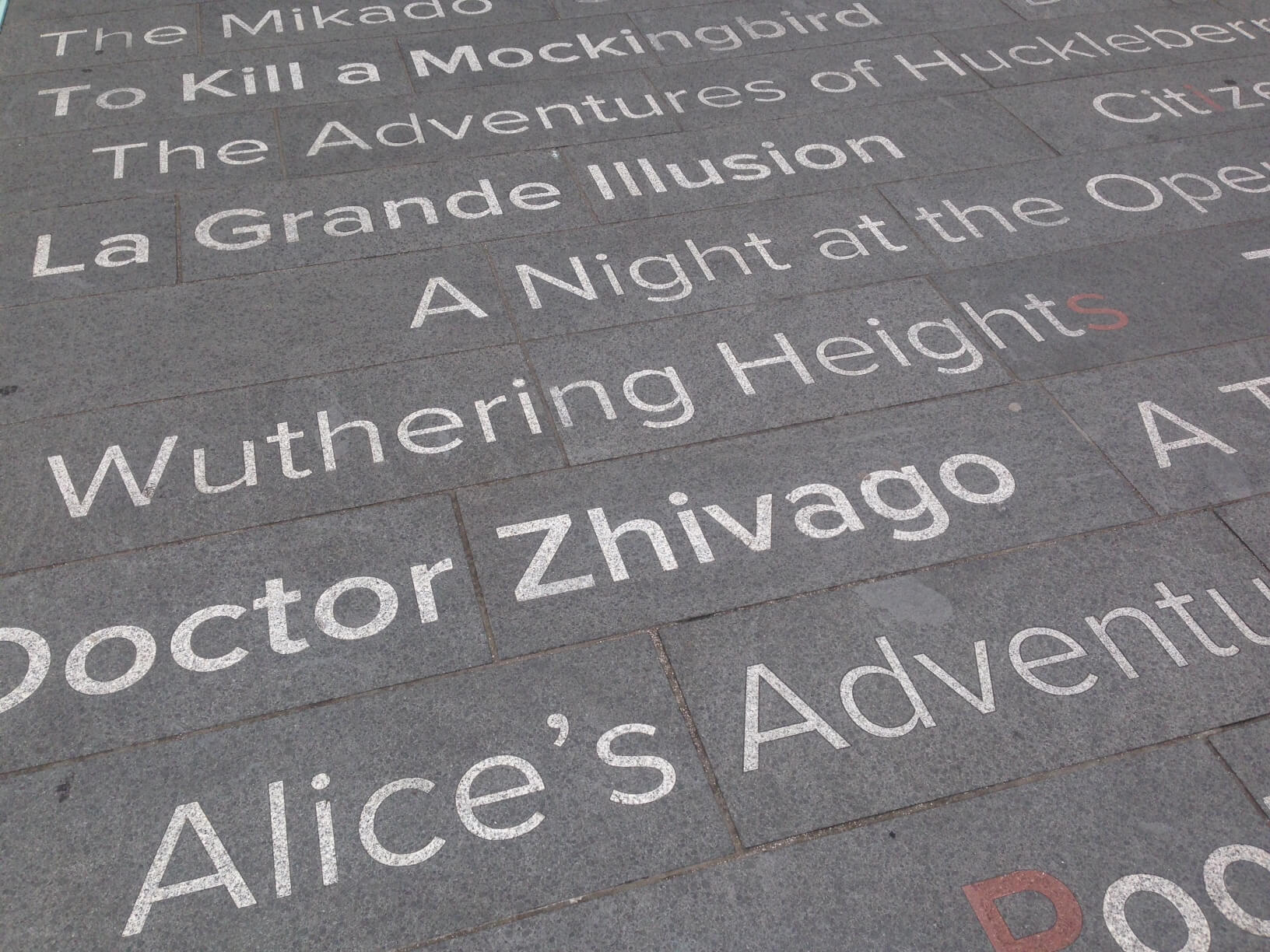We’re not social workers but… Professional identities in collaborative cultural work
Added on Wednesday, June 29th, 2016
…
Way back in the dawn of time, I started my academic research career thinking about professional identities in the library and information services (LIS) sector. I had been training to be a university librarian, mostly because I fancied myself as a female, slightly less grumpy, but much better dressed Philip Larkin. I was based at Leeds Beckett University and was lucky enough to receive a full studentship from its library school to conduct postgraduate research on the impact of operational convergence on professional identities and practices in academic libraries. The trend at the time was for merging libraries with computing and other student services to create one-stop-shop Learning Centres, a process that I had experienced myself in Leeds and took to be a step removed from my romantic perceptions of librarianship.
After losing all my Philip Larkin aspirations, I moved on to cut my early career teeth at the University of Sheffield’s Centre for the Public Library and Information in Society (CPLIS). The shift from academic to public libraries created a more interesting platform from which to consider political, societal and cultural influences upon professional identities and characteristics of the sector, especially as CPLIS specialises in areas of social justice, diversity and public value. Working alongside the brilliant Dr Briony Birdi, our projects included an audacious two-year study of public library staff attitudes towards and engagement with social inclusion policy in England, funded by the Arts and Humanities Research Council (2006-08).
The research took as its starting point the value of empathy as a professional skill in community librarianship, and considered the relationships between workforce cultural, social and professional identities, organisational cultures and practices and the sector’s capacity to engage with and contribute to New Labour inspired social inclusion policy objectives. As with many studies of this nature, the research revealed pockets of excellence, including examples of responsive and committed socially engaged librarianship in qualitative discussions and the profiling of reputable case study projects. More worrying however was the systematic experience of role dissonance and strain in more challenging social circumstances; resistance to change amongst a culturally homogenous workforce; lack of understanding of the political concept and lived experience of social exclusion; each perpetuated by insufficient recruitment policies; limited training and development opportunities; non-communicative, hierarchical local authority structures; and a perceived superficial tick-box approach to social inclusion targets and objectives.
It was easy to be critical of these strategic and operational limitations and of the less than desirable attitudes (in some cases) of staff working in statutory public services. The stresses of working with some vulnerable groups when not feeling adequately qualified to do so however were a very real concern for some research participants. I can still hear the tired and frustrated voice of one focus group participant in the North East as they gave me this quote:
“There is a question to what extent is it our job? I mean yes, we’re working in a public service… but you’re not a youth worker, you’re not a social worker, so down which road do you go?”
In many respects the Right Man project was a bruising research experience, so I let my professional identity interests simmer for a while, in order to rebuild a more objective position. They have resurfaced via current research at the ICC, including a long-term empirical study on the value of museums in dementia care, in partnership with National Museums Liverpool (NML). When reading around this project I came across the work of Dr Nuala Morse and Dr Ealasaid Munro on museum community engagement schemes, austerity and practices of care. The research considers the everyday work of museum community engagement teams as forms of ‘progressive localism’ and as integral parts of local landscapes of care, with the legacy of New Labour’s social inclusion policy still influencing professional values and practices. Nuala very kindly visited the ICC on 20th June to host a seminar on her research. In the discussion that followed, the value of professional identity as a conceptual framework for museum outreach workers’ multiple responsibilities was questioned, given the strict boundaries conventionally used to define ‘the professions’.
Museums, libraries and professional jurisdiction
In a macro sense, professions position themselves within wider societies and markets by undertaking a sophisticated process of strategic organisation, whereby a profession negotiates and regulates itself in order to achieve a determined monopoly or jurisdiction. Professions are subsequently defined as not only the single domains of specialist knowledge and expertise, but the process also requires professionals to be worthy of trust, and in return for professionalism in client relations, professionals are rewarded with authority, privileged rewards and higher social status. Given these conditions, what claim do library and museum sectors have to a professional monopoly in the first place? Both have regulatory professional bodies including the Chartered Institute of Library and Information Professionals and the Museums Association, each prescribing entry levels and qualification frameworks; codes of ethics; continuing professional development structures; and routes to chartered status for library professionals.
Their professional standing is routinely challenged however by issues such as a propensity of what are regarded as more generic, transferable skills as opposed to specialist areas of knowledge and expertise. Other challenges to professional structures include considerable upskilling of para-professional and front of house roles, resulting in a process of deprofessionalisation via flattening of traditional professional hierarchies, and the routine employment – in many cases underemployment – of graduates from a host of other non-specialist disciplines. In response the library sector in particular is keen to preserve and defend its independent professional credentials, as illustrated by this recent report on the value of trained library and information professionals.
As statutory local authority services, public libraries could also be held accountable to other codes of practice, including for example the 7 principles of public life, applied to anyone working in public office including health, education and social care services. As socially engaged and policy responsive cultural practice expands, there is inevitable blurring of boundaries across relevant professional groups. The Royal Society of Public Health has recently undertaken a study of the wider public health workforce, which recommends integrating a range of sectors including ‘librarians and related occupations’ into more concerted attempts at place-based preventive health and wellbeing strategies. Other related agendas including the cross-sector role of arts and culture in devolution agreements and momentum behind cultural commissioning from statutory health and social services are motivating the sector to renegotiate its professional domain.
| ‘Cultural skills such as reader development in public libraries and reminiscence activities in museums can reinforce the unique professional identities of cultural practitioners in collaborative work with health and social care sectors.’ |
Unique professional value in cultural collaborations
Nuala’s research on everyday museum care practices points to the value of partnership working in helping museums to fulfil their social objectives. Partnership working and collaboration have been recurring positive indicators in my own research on policy-responsive cultural practice, including the Right Man study and current research with NML on the museums-led dementia awareness training programme House of Memories, launched with funding from the Department of Health in 2012. Successive evaluation studies have revealed considerable outcomes for participating health and social care workers – now in excess of 10,000 – in relation to person-centred dementia care, which can be attributed to the reminiscence-based creative content of the programme. There is absolutely no suggestion through this work that museum professionals are expected to demonstrate the skills of health and social care workers.
Most recently NML has been commissioned by Health Education England (HEE) to develop and deliver a pilot train the trainer programme in collaboration with NHS partners including the Countess of Chester NHS Foundation Trust; Wirral University Teaching Hospital NHS Foundation Trust; Christie NHS Foundation Trust, Manchester; and PSS Community Health (person shaped support), Liverpool. The programme was designed to meet advanced Tier 2 dementia care objectives as defined by the national Dementia Core Skills Education and Training Framework, published by Skills for Health in October 2015. Social value analysis resulted in a social return on investment (SROI) ratio of £1: £19.06 for HEE. House of Memories evidences the cultural value of museums in contributing to core skills development in dementia care as a public health priority, and the social and economic value of cultural collaborations to health and social care stakeholders.
Other scalable examples of effective cross-sector collaborative working include the national Reading Well books on prescription scheme led by The Reading Agency, which involves a network of public library authorities and referral services. Cultural skills such as reader development in public libraries and reminiscence activities in museums therefore can reinforce the unique professional identities of cultural practitioners in collaborative work with health and social care sectors, or cultural work that seeks to have health and social outcomes of benefit to extended professional communities of practice. The value attached however to the unique professional practices of cultural sectors by different, collaborating sectors and services is inherently linked to the quality of that cultural practice and its causal connection with outcomes achieved. Trust is a key component of collaborative working as well as an indicator of professional prowess. Through evidencing the uniquely attributable cultural value of cross-sector collaborative work, it is perhaps easier to defend the independent professional identities and virtues of our cultural sector?










